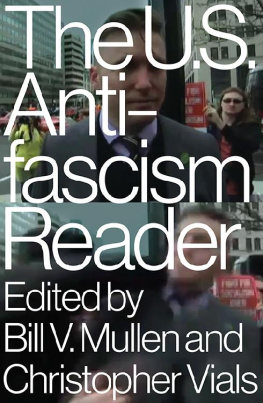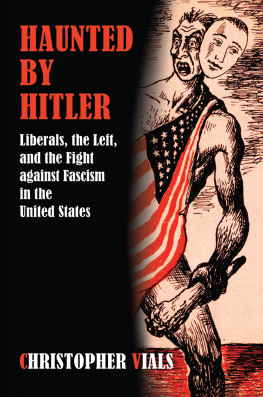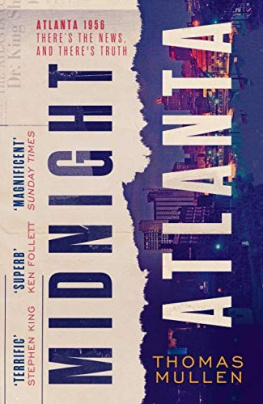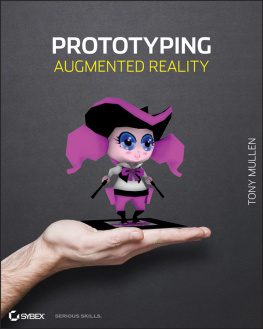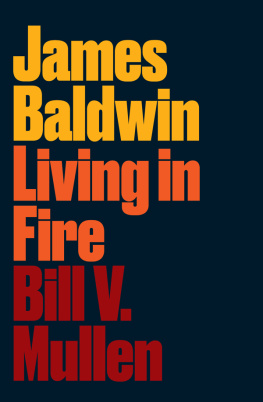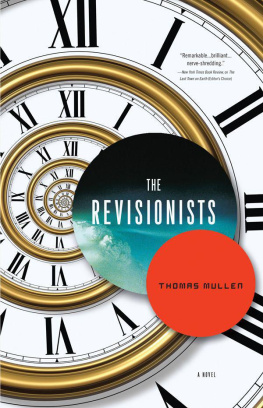Bill V. Mullen - The US Antifascism Reader
Here you can read online Bill V. Mullen - The US Antifascism Reader full text of the book (entire story) in english for free. Download pdf and epub, get meaning, cover and reviews about this ebook. year: 2020, publisher: Verso Books, genre: Politics. Description of the work, (preface) as well as reviews are available. Best literature library LitArk.com created for fans of good reading and offers a wide selection of genres:
Romance novel
Science fiction
Adventure
Detective
Science
History
Home and family
Prose
Art
Politics
Computer
Non-fiction
Religion
Business
Children
Humor
Choose a favorite category and find really read worthwhile books. Enjoy immersion in the world of imagination, feel the emotions of the characters or learn something new for yourself, make an fascinating discovery.
- Book:The US Antifascism Reader
- Author:
- Publisher:Verso Books
- Genre:
- Year:2020
- Rating:3 / 5
- Favourites:Add to favourites
- Your mark:
- 60
- 1
- 2
- 3
- 4
- 5
The US Antifascism Reader: summary, description and annotation
We offer to read an annotation, description, summary or preface (depends on what the author of the book "The US Antifascism Reader" wrote himself). If you haven't found the necessary information about the book — write in the comments, we will try to find it.
The US Antifascism Reader — read online for free the complete book (whole text) full work
Below is the text of the book, divided by pages. System saving the place of the last page read, allows you to conveniently read the book "The US Antifascism Reader" online for free, without having to search again every time where you left off. Put a bookmark, and you can go to the page where you finished reading at any time.
Font size:
Interval:
Bookmark:
The US Antifascism Reader
The US Antifascism Reader
Edited by
Bill V. Mullen and Christopher Vials

First published by Verso 2020
Collection Bill V. Mullen and Christopher Vials 2020
Contributions The Contributors 2020
Excerpt from The Authoritarian Personality reprinted with permission. New York:
American Jewish Committee 1950. www.ajc.org All rights reserved.
Pieces from Avedis Derounian republished with permission of Elyse Derounian Rogers.
Barbara Ehrenreich, Foreword, in Klaus Theweleit, Male Fantasies, Volume 1: Women, Floods,
Bodies, History was reprinted with permission of The University of Minnesota Press 1987.
Excerpts from It Cant Happen Here by Sinclair Lewis 1935 by
Sinclair Lewis, renewed 1963 by Michael Lewis. Used by permission of Signet, an imprint of
Penguin Publishing Group, a division of Penguin Random House LLC. All rights reserved.
The McCarthy Falange 1954 by the Christian Century. Reprinted by permission from
the Dec 29, 1954, issue of the Christian Century. www.christiancentury.org.
Enzo Traverso, Trumps Savage Capitalism: The Nightmare is Real, in World Policy Journal,
Volume 34, no. 1, pp. 1317. 2017, World Policy Institute. All rights reserved. Republished
by permission of the copyright holder, and the present publisher, Duke University Press.
All rights reserved
The moral rights of the authors and editors have been asserted
1 3 5 7 9 10 8 6 4 2
Verso
UK: 6 Meard Street, London W1F 0EG
US: 20 Jay Street, Suite 1010, Brooklyn, NY 11201
versobooks.com
Verso is the imprint of New Left Books
ISBN-13: 978-1-78873-350-2
ISBN-13: 978-1-78873-695-4 (HARDBACK)
ISBN-13: 978-1-78873-351-9 (UK EBK)
ISBN-13: 978-1-78873-352-6 (US EBK)
British Library Cataloguing in Publication Data
A catalogue record for this book is available from the British Library
Library of Congress Cataloging-in-Publication Data
A catalog record for this book is available from the Library of Congress
Typeset in Minion Pro by Hewer Text UK Ltd, Edinburgh
Printed and bound by CPI Group (UK) Ltd, Croydon CR0 4YY
Contents
_____________
____________________________
All books are collective, this one more than most. It reflects learning from, and organizing with, a wide range of people committed to the analysis of and fight against fascism. These would include: Joe Allen, Maximillian Alvarez, Megha Anwer, Chip Berlet, Tithi Bhattacharya, Will Biel, Marcel Bois, Jason Chang, Nigel Copsey, Mathew Dittman, Nada Elia, Amy Fehr, Sue Ferguson, Meleiza Figueroa, Evan Fritz, Hugo Garca, Micah Goodrich, Jane Gordon, Todd Gordon, Kate Doyle Griffiths, Albeta Hjkov, Rebecca Hill, Aaron Jaffe, Alaina Kaus, Bre Leake, Fred Lee, Holly Lewis, Grant Mandarino, David McNally, Dana Mills, Adam Miyashiro, Wyatt Mund, Mimi Nguyen, David Palumbo-Liu, Ian Alan Paul, Jerry Phillips, Clayton Plake, Charlie Post, David Renton, Cathy Schlund-Vials, Malini Schueller, Dan Siegel, Hayley Stefan, G. M. Tams, Enzo Traverso, Jarred Wiehe, and Anna Ziering.
We would especially like to thank the Humanities Institute at the University of Connecticut, particularly Michael Lynch and Alexis Boylan, for awarding us a grant to cover the permissions and copyright costs associated with this book. Without this crucial support, the scope of the book would have been very limited. We would also like to thank Alan Wald for his mentorship in helping us to find crucial individuals and artifacts of the antifascist left and to Benjamin Balthaser for his scholarly assistance. Jim Baggett at the Birmingham Public Library was also quite generous in helping us locate material on Asa Carter, and Jen Hoyer and Michelle Hardesty were true comrades for getting us the material on Anti-Racist Action from the Interference Archive in Brooklyn, New York. We owe a real debt of gratitude to Elyse Derounian Rogers for allowing us to use her fathers writings, as well as to Marc Mamigonian at the National Association for Armenian Studies and Research for all his support with the Avedis Derounian Papers. A special thanks also to the American Studies Writing Group at the University of Connecticut, which provided valuable feedback on the introduction (Peter Baldwin, Kate Capshaw, Martha Cutter, Nina Dayton, Jeff Dudas, Clare Eby, Kathy Knapp, Shawn Salvant, Nancy Shoemaker, Manisha Sinha, David Yalof). Last but certainly not least, we would like to thank the living antifascists in this collection, not only for their contributions to real democracy, but for generously allowing us to use their work: Mark Bray, Kathleen Cleaver, Les Evans, Ken Lawrence, Sam Miller, Penny Nakatsu and Enzo Traverso.
A special shout-out goes to members of the Campus Antifascist Network (CAN). We helped found the group in June of 2017 after American fascists marched through Bay Area streets. Since then, a founding group of forty grew to include more than 2,000 people. The Network built chapters at more than a dozen campuses in the United States, the UK, and Canada. CAN organizers have helped build rallies against eugenics proponent Charles Murray at the University of Michigan, neo-Nazi Richard Spencer at Michigan State University, and alt-right hack Lucian Wintrich at the University of Connecticut. Those protests have slowed the momentum of a small but nascent fascist and neofascist movement. They have demonstrated a theory and practice of popular antifascism that this book seeks to remember, commemorate, and keep alive.
Introduction: Anti/Fascism
and the United States
_______________________________
We assembled this collection because of fascisms loud return to the world stage as an animating political idea and an aspirant mode of political rule. Its return results from a complex weave of epochal shifts: the global economic slump of the 1970s and the attendant rise of neoliberal market ideologies; wide-scale attacks by elites and global financial institutions on working-class lives and social welfare; continuing deracination of workers organizations, including trade unions; the collapse of official state communism in the Soviet Union and the Eastern bloc countries; 9/11, myriad Wars on Terror and Islamophobic panics generated across the capitalist West; population displacement from Middle Eastern, predominantly Muslim countries like Syria into Western Europe precipitated by the US invasion of Iraq and subsequent rise of ISIS into the resultant political vacuums; and the second global financial collapse of 20072008. In many traditionally democratic and capitalist Western states, these events have combined to erode lateral affiliations necessary for left-democratic politics and helped actuate a political third space, beyond conservativism and social democracy, a predominantly white, racist, nationalist, middle-class backlash that finds expression in a politics of resentment, victimhood, xenophobia and anti-leftism traditionally associated with classical fascism. In the United States, the return of fascist appeals relies on foundations much deeper in scope: namely, a history of white racial identification and settler colonial militarism, centuries in the making, without which the specter of an American fascism would be nearly unthinkable.
These historical coordinates are more durable in significance than the individual far-right figures and movements they have so far produced: individuals like Geert Wilders in the Netherlands, Marine Le Pen in France, and Jair Bolsonaro in Brazil, or movements such as CasaPound in Italy and Golden Dawn in Greece. They overwhelm in importance the dog whistle US politician of aspirant fascistsDonald Trumpwhose election in 2016 was a tenuous constellation of the global currents enumerated above: a candidate who unconsciously rediscovered a fascist rhetorical style, rather than building a fascist-like movement. Yet Trumps election to the highest office of the worlds most powerful militarized and capitalist state
Next pageFont size:
Interval:
Bookmark:
Similar books «The US Antifascism Reader»
Look at similar books to The US Antifascism Reader. We have selected literature similar in name and meaning in the hope of providing readers with more options to find new, interesting, not yet read works.
Discussion, reviews of the book The US Antifascism Reader and just readers' own opinions. Leave your comments, write what you think about the work, its meaning or the main characters. Specify what exactly you liked and what you didn't like, and why you think so.

